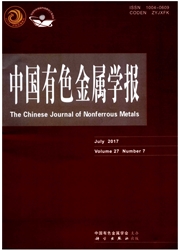

 中文摘要:
中文摘要:
在时效温度为438~458 K、实验应力为120~180 MPa的条件下,采用RWS-50型电子蠕变机对2219铝合金蠕变时效行为进行研究。采用包含双曲正弦函数的方程,通过对实验数据的线性回归分析,确定应力指数、蠕变激活能及相关常数,建立2219铝合金稳态蠕变速率与实验应力及时效温度之间的关联本构模型。结果表明:随着实验应力的增大和时效温度的升高,2219铝合金的稳态蠕变速率增大,且蠕变曲线在第二阶段的持续时间缩短;依据本构方程计算出该铝合金在各条件下的稳态蠕变速率与其实验值的平均相对误差为4.22%,表明该本构方程可为2219铝合金蠕变时效成形工艺的制定提供理论依据。
 英文摘要:
英文摘要:
The creep aging behavior of 2219 aluminum alloy was studied on the RWS-50 electronic creep testing machine at 438-458 K with the stress range from 120 to 180 MPa. By adopting the equations including hyperbolic sine function and by linear regression analysis of experimental data, the stress index, the creep activation energy and the related constants were determined. The constitutive relationship among steady creep strain rate, tested stress and aging temperature of 2219 aluminum alloy was obtained. The results show that the steady creep rate increases with the increase of tested stress and aging temperature. And the second step in creep curves becomes short. The average relative error of steady creep strain rate between theoretical value computed by the constitutive equation and actual value is only 4.22%, and the constitutive equation can provide theoretical basis for formulating creep aging forming process of 2219 aluminum alloy.
 同期刊论文项目
同期刊论文项目
 同项目期刊论文
同项目期刊论文
 期刊信息
期刊信息
